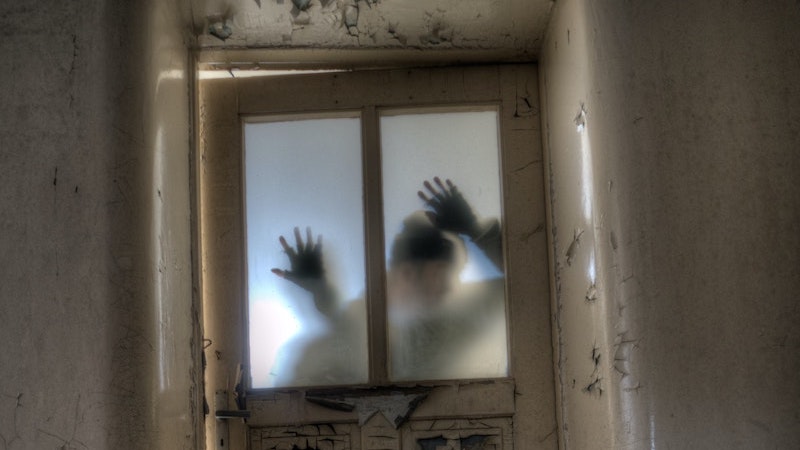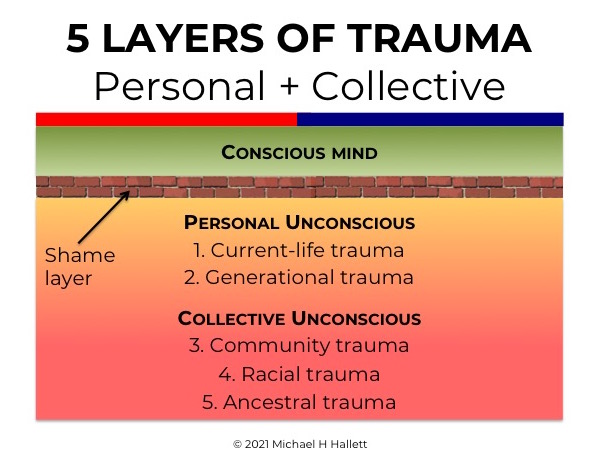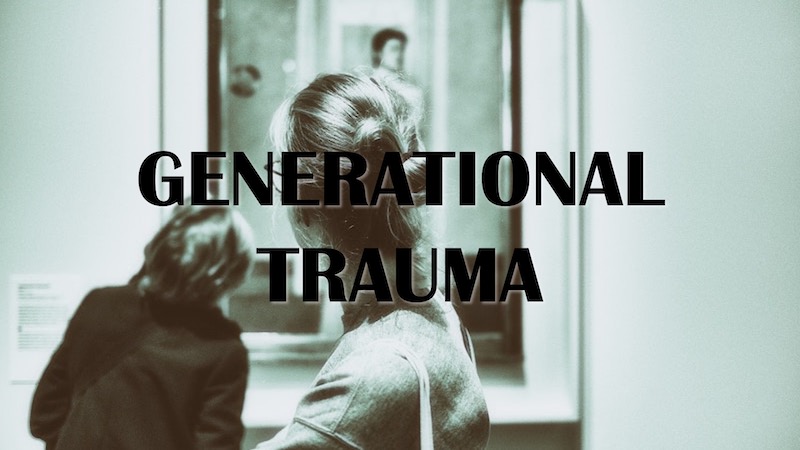Trauma is inside us and we are inside trauma
- 26 February 2021
- Posted by: Michael H Hallett
- Category: Generational trauma ,

In Trauma exists as a series of ripples, I describe the multiple, interconnected sources of trauma that may exist in our lives. This trauma is inside our minds, our psyche, our physical cells—our DNA. Yet even this doesn’t help us comprehend the full extent and impact of human trauma.
Once we raise our children in ignorance of their own trauma, it isn’t just inside us. We are inside trauma. We’ve created a bubble where trauma is ever-present, invisible and normal.
All trauma is buried in our unconscious under a layer of shame and denial. Trauma can be personal (unique to us) or collective (shared with circles of others).

- Current-life trauma—trauma from events in our current lifetime
- Generational trauma—trauma inherited from our immediate ancestors, typically from unresolved events that occurred to our parents and grandparents
- Community trauma—trauma that affects an entire, specific community
- Racial trauma—trauma that affects an entire, specific race
- Ancestral trauma—trauma inherited from remote ancestors, up to several thousand years old, that affects everyone living in patriarchal societies
The conventional take on trauma is that it’s something some people have, and some don’t. When you look at the above diagram it becomes clearer that trauma is something that we all have to some degree.
This means we live in an environment where trauma is so normal—and so normalised—that it’s difficult to recognise. Peter McBride, Director of the Cohen Center for Holocaust and Genocide Studies, commented at the 2021 Intergenerational Trauma Conference that “there’s trauma everywhere.”
Yes, trauma is inside us—but we are also inside trauma.
Trauma is inside us
Trauma affects us at the mental, emotional and physical level. The term Post-Traumatic Stress Disorder (PTSD) suggests that stress is the downstream effect of a traumatic event that happened in the past. Epigenetic inheritance demonstrates that this event may been in our past—or that of a recent or remote ancestor.
Yet to see PTSD as an after-effect is incorrect. The stress from traumatic events is literally frozen in time and transmitted from generation to generation. Peter McBride notes that the stresses felt by PTSD sufferers aren’t memories but an actual re-experiencing of the past. It’s as if they’re re-living the original experience—whether theirs or inherited.
McBride remarked that the multi-generational aspect makes it “difficult to link current phenomena with past traumas.” None of us wants to know that we’re carrying trauma. What do we do with that knowledge? How do we resolve it?
To avoid these dilemmas, we cling to our story: trauma is inside us. It’s in some of us but not others. Then we change our story—the narrative of our existence—to ignore the trauma.
Peter McBride: “Traumatised people change the narrative they have about their own identity. They change the way they brought up their children.”
We are inside trauma
Once we raise our children in ignorance of their own trauma, it isn’t just inside us. We are inside trauma. We’ve created a bubble where trauma is ever-present, invisible and normal.
Call it the matrix, call it the system, the machine, the morphogenetic field. It doesn’t matter whether it’s a fictional construct—like the film The Matrix—or whether it’s real. The point is that it behaves as if it’s real.
At ITC 2021 Professor Kenneth V. Hardy said that, “racial trauma is like a toxic gas that we can’t see, we can’t touch it, but we know it exists, and we know it’s destructive.” Not just racial trauma. All trauma is like this. The more people it affects, the more toxic the gas, and the more difficult the attribution to current issues.
Peter McBride describes trauma as “the normalisation of the abnormal”. We’re surrounded by the abnormal and consider it normal.
Peter Levine likens trauma to a “rupture in the fabric of connectivity”. Trauma disconnects us from each other, to some degree. Most of all, it disconnects us from our ability to nurture ourselves. I call this the mother wound. The result is alienation.
Alienation
In The Politics of Experience, psychologist R.D. Laing writes, “We are born into a world where alienation awaits us… No one can begin to think, feel or act now except from the starting-point of their own alienation.”
Early psychoanalyst Wilhelm Reich calls this “the psychic massacre to which everybody is subjected.” We “mistake sickness for health and health for sickness.” That sickness is reflected in our virus-prone bodies, our dog-eat-dog society, our toxic environment.
R.D. Laing observed that “our collusive madness is what we call sanity.” The first step to healing this madness is recognising its scope—that we exist inside a trauma.
Next steps
For further resources on generational trauma, both free and paid, please click on this image.
Photo by Nathan Wright on Unsplash

